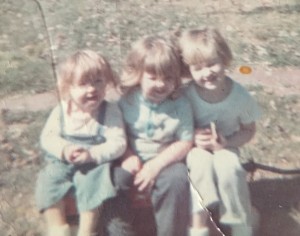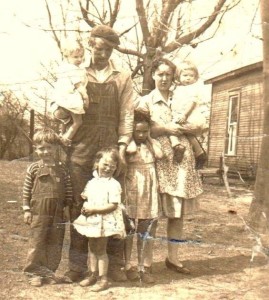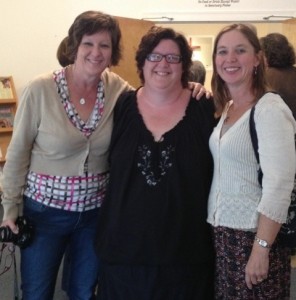
How do you remember your past-your growing up? Difficult? Easy? Carefree or demanding? Rather than remember, is it one you’d soon forget? Mine has a mixture of both. When I was just shy of 6 years old, I stood with my sisters on the shore of an old coal mine strip pond as we called it, in rural Indiana watching my young parents drown in a freak fishing accident. This would truly define much of who I was to become in the years to come. We three girls went to live with my maternal grandparents. We were very poor by worldly standards, but though we were low on money, we were high on vegetable gardens and a few livestock. I bet you thought I was going to say, “Though we were low on money, we were high on love.” Well, not really. I don’t believe in painting an unrealistic picture of my life after the deaths of my parents. I’ll never be accused of overestimating the affection coursing through our home as a child. My oldest sister was separated from us when she was only 13 years old to a teen home 2 hours away. I was 10. I would only see her every other weekend and holidays for our remaining childhood years. We were afforded no counseling and no time to grieve. No one was reading me bedtime stories, hanging my artwork on the refrigerator, or telling me I could grow up to be whatever I wanted to be. I didn’t learn how to communicate well in relationships. It was a lot more about resilience than it was warm fuzzies. It was primarily about work, responsibility, and self-initiative. Less about love, tenderness, and family vacations. This is not a plea for pity. It’s just a story. And like so many others, my past is inextricably linked to the past before me. That renders understanding and insight for all us in better understanding our American roots. My grandparents did the very best they could with what they had. I could never in a million years repay them for their contributions in my life, and in spite of a childhood lacking in tenderness, they loved us still in the only ways they knew how. I didn’t have a lot, but I had everything they were capable of giving me. They did not withhold affection out of spite. Their love language-their only love language-was service. Before you say, “Oh that’s so sad,” while on one level it is, on the other hand, I did learn how to survive difficult ordeals, orchestrate food for large groups of people, and the value of hard work and perseverance. I (and my sisters) absolutely entered young adulthood with an insufficient lack of emotional coping skills. Undoubtedly, we were at a clear disadvantage when it came to understanding what it meant to nurture and to be nurtured. There were scars just like there are for many of you. Nonetheless, while we had a “raising” that didn’t render itself as always rosy or self affirming, we can say with 100% assurance that we weren’t nurtured at home because well, nurture just wasn’t in their nature. In fact, it was their raising that made them bull-headed and even cold at times. They and their parents before them had survived both world wars, Vietnam, Korea, bad politicians, good politicians, The Great Depression, short life spans, and grueling manual labor both at home and at work. Indeed my grandparents were an intricate part of that generation who built up American industry, the backbone of American farming and post depression economic growth. They stormed the beaches at Normandy, lived and died in The Bataan Death March, and saved the free world from tyranny. They worked the tough, hard labor jobs that rebuilt a post war America into a global power. This generation was not one that excelled at nurturing. They excelled at survival. This was also reflected in their huge sense of community. Because of their experience in the war and the Depression, they recognized (better than we do today) that people work better and accomplish more together than they do apart. Thus in war-time, they gave up their “day jobs” to build Higgins Boats in Louisiana, and sell war bonds on Main Street. In snow blizzards, whoever owned a tractor, plowed the driveways of those who did not. Potluck dinners for years, served to feed the masses while accomplishing their tasks at hand, planting fields, raising barns, or building fences. When someone was sick and homebound, there was undoubtedly a neighbor nearby to bring them hot soup or cart then to the doctor if necessary. Hard work wasn’t an option. Rest was overrated. Everyone was working the garden, the livestock and doing laundry. (NOT in an automatic washer and dryer that we enjoy today!)
Not surprisingly, my grandparents, from this very generation, lived impoverished lives growing up and likewise when raising their own children, my mother and her siblings. Their income was meager. Inevitably their days were long and difficult. The picture here truly speaks 10000 words.

On the left is my great-uncle, actually my grandma’s youngest sibling of 14. My great-grandmother was already dead in this picture. My grandmother took her brother in when he was 16 months old. She had other small siblings in her home as well. The oldest daughter between my grandparents is my grandma’s first daughter from her first marriage. That husband died when she was only 17 or 18 in a work related accident. There was no OSHA then. There were no annuities for my grandmother, a widow and single mother at 17. A year later she married my grandfather. Sometimes you married or you starved. They had 5 children. That’s their first-born, my aunt you see in the front wearing glasses, and my grandparents holding the twins in their arms: my mother and her twin sister, and later two additional boys came along (not yet born when this picture was taken.) It seems counterproductive to those of us ever so enlightened by this modern society in which we live (sarcasm intended), that such impoverished folks would choose to have so many children. Having offspring was much more of a cultural expectation in America in those days than it is now. Furthermore, this was the generation of Americans that populated our country. The baby boomers born in post war American between 1946-1964 (give or take a year), was literally the largest generation of Americans born in U.S. history. (Yours truly says thank you for that!)
Today we live in an incredibly great country. One that is still full of promise and opportunity. But it is also one of the most self-entitled, materialistic, and self-centered cultures that American has ever known. This I believe is the American Dream gone rogue. Once upon a time the American Dream was defined simply as the opportunity for home ownership in a free society where every citizen was free to innovate, create and live peaceably. But that definition of the American Dream has since been distorted, the original tenets of which have been misused and misrepresented by scores of politicians hoping to strike a chord of unity with a society that has distanced themselves from their past, away from their poorer, less formidable ancestors. Even though, it was their ancestors who blazed the freedom trail for us through hard work, war, and personal sacrifice, so that we could now “wallow” in the plunder. I don’t want to be an American who simply sits back and wallows in what my grandparents have built. I want my citizenship to be one that pours back into the communities I live in-the communities bequeathed to me by generations of Americans before me. What do Americans of the 21st century owe them? Impoverished though they were; unskilled communicators, slow to show affection, demanding, and maybe even harsh? We owe them everything.

Pull out the pictures-you know the ones! They’re in the deep drawer of your grandma’s bedroom chest of drawers full of black and whites (reel to reel if you’re lucky) Ask someone who will know: “Who’s that?. What did they do for a living? How did they die?” You may discover amazing and healing facts about your relatives, as well-about yourself and who you are and from whence you came. And in the process, learn something about your America.
Hi Judy.
Merry Christmas.
Thanks .xx
Anja and Rob
You’re Welcome Anja. Hope you and Rob are doing well.
Judy, my friend. As I promised I read your story about what we owe….. we had a good conversation about that last week…. What you are writing about this topic is so true. But we learn to accept it not before we ourselves are adults ….. maybe not before we have children ourselves.
Thanks for writing…..go on.
Big hugs from Tanja
I agree Tanja. Many lights pop on in our heads as we grow older and for sure after we have children of our own!